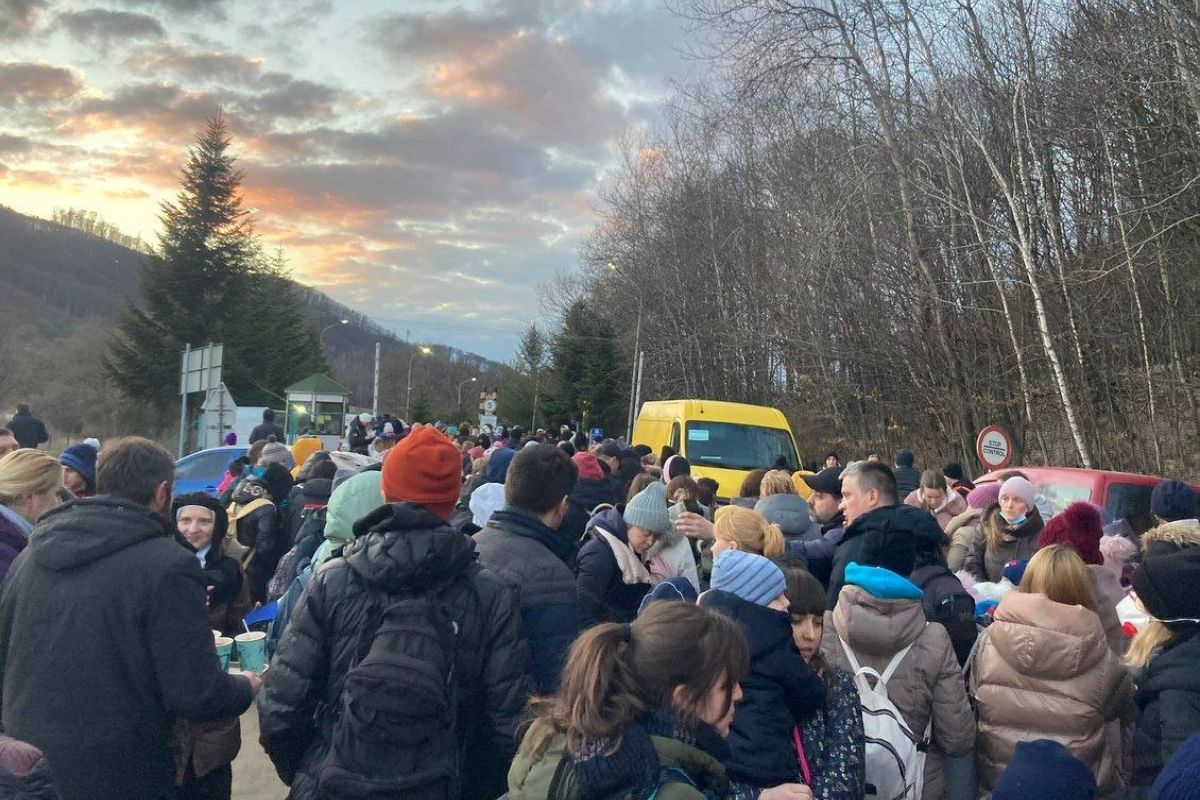As the heavy fighting continues unabated, Cesvi is working tirelessly to bring its support to the hard-hit civilian population. In the government-controlled areas of the Donetska, Luhanska and Kharkivska oblasts in eastern Ukraine several cities, towns and villages are on the brink of a humanitarian catastrophe. The human cost of the violence is becoming more evident with each passing day. Between 4 a.m. on 24 February and midnight on 27 February, the Office of the United Nations High Commissioner for Human Rights (OHCHR) confirmed at least 406 civilian casualties, including 102 deaths, and it is feared that the real figures are much higher. OHCHR also reported that most civilian casualties were caused by explosive weapons, including heavy artillery and multiple launch rocket systems (MLRS) bombardment, and airstrikes.
Desperate need for food, water and shelter
Across the country, especially in eastern Ukraine, water infrastructure has been severely damaged; repair work has been hampered by continued shelling and de-mining is required. Since the morning of 28 February, more than 300,000 people have been without electricity, while more than 11,600 people no longer have access to gas supplies in the oblasts of Chernihivska (north), Kharkivska (north-east), Kyivska (north), Rivnenska, Sumska (north), Zaporizka (south-east) and Zhytomyrska (north). About 2.7 million people on both sides of the ‘contact line’ receive water twice a day, while about 124,000 are without access to water (UN). Food supplies are running out everywhere with grocery shop shelves almost empty. After days of continuous shelling, there is a desperate need for food, water and shelter.
More than 100,000 displaced people
The United Nations Refugee Agency (UNHCR) estimates that more than half a million people have fled to neighbouring countries; more than 100,000 have been internally displaced in sub-zero winter temperatures. Most of the people fleeing are women and children, as men are not allowed to leave the country. The waiting time to cross the 14 km backwater to Poland can be up to 40 hours, with temperatures as low as -2°C at night. Families are desperate, cold, afraid and hungry.
This is one of the fastest exoduses ever in European history. More than 280,000 have fled to Poland. Another 94,000 in Hungary, almost 40,000 are currently in Moldova; 34,000 in Romania, 30,000 in Slovakia; tens of thousands in other European countries.
As thousands continue to flee the violence to the west of the country, there is a desperate need for food, water and shelter as raions (districts) and oblasts (regions) run out of resources to deal with the massive influx of internally displaced people.
Hospitals collapsing and running out of oxygen
Hospital operations are threatened by continuous power outages and the constant risk of ambulances and medical staff being caught in the crossfire.
The increase in cases of COVID-19 from Omicron, with some 1,700 patients currently in hospitals across the country, further complicates the already difficult health response amid ongoing hostilities. According to the World Health Organisation (WHO), the supply of oxygen in Ukraine is dangerously low, with most hospitals at risk of running out of their oxygen reserves in the next 24 hours, putting thousands of lives at risk.
To make matters worse, the continuity of hospital services is threatened by continuous power cuts and the persistent risk of ambulances and medical staff being caught in the crossfire. The safe and constant supply of essential medical supplies and uninterrupted access to emergency medical care are crucial.
Cesvi in the Field with PIN
The first three trucks of humanitarian aid on their way to Ukraine, two more will join them in Slovakia.
Through People in Need (PIN), our Alliance2015 partner, we sent the first convoy of truckloads of humanitarian aid, as requested by the authorities in L’viv in western Ukraine, containing tinned food, hygiene kits, nappies, medical supplies, sleeping bags, mattresses and other essentials. Colleagues are in L’viv, where tens of thousands of internally displaced people are pouring in as sirens warn of the threat of a Russian attack.
Another team has arrived on the Slovakian border to provide support to those waiting to cross. Aid, transport and shelter – such as insulated tents for displaced children – are the most useful items at the moment. Assistance has also begun at the Romanian border near Moldova, where queues of several kilometres are forming with people waiting to cross the border. We also want to help people with special needs, such as children and the elderly.
Cesvi’s Emergency team has also left to intensify its intervention to support the people fleeing to Poland, Moldova, Romania and Hungary.
© Photo credits: People in Need
